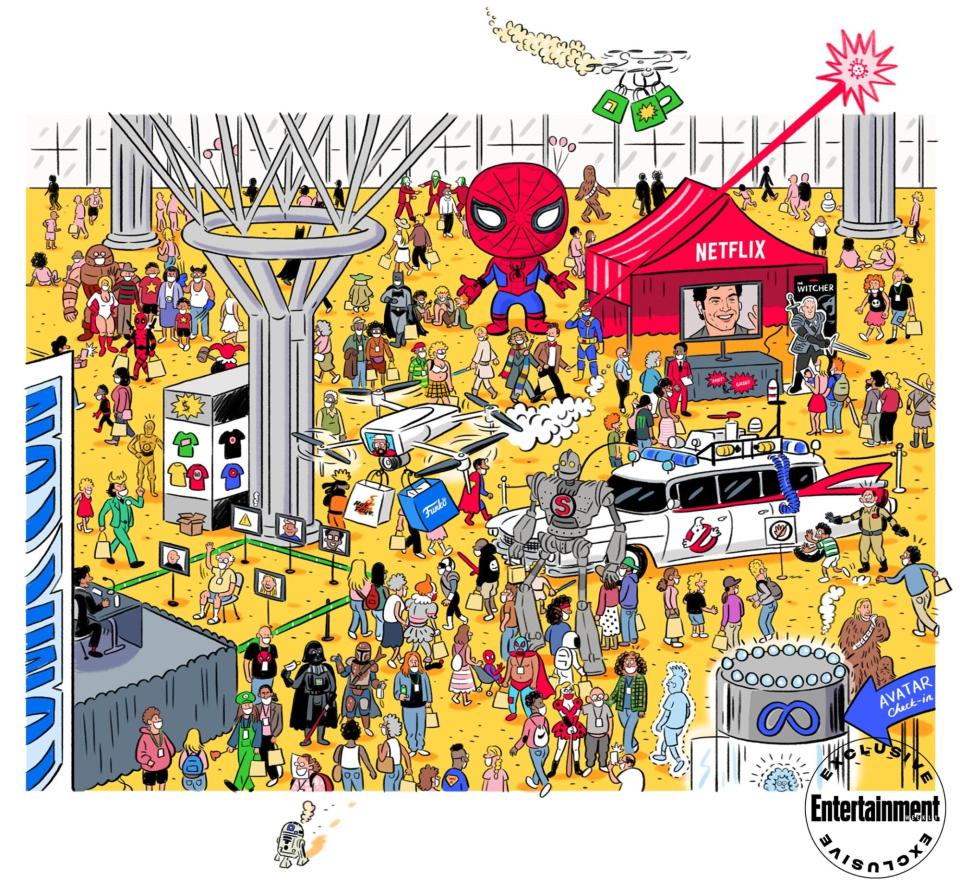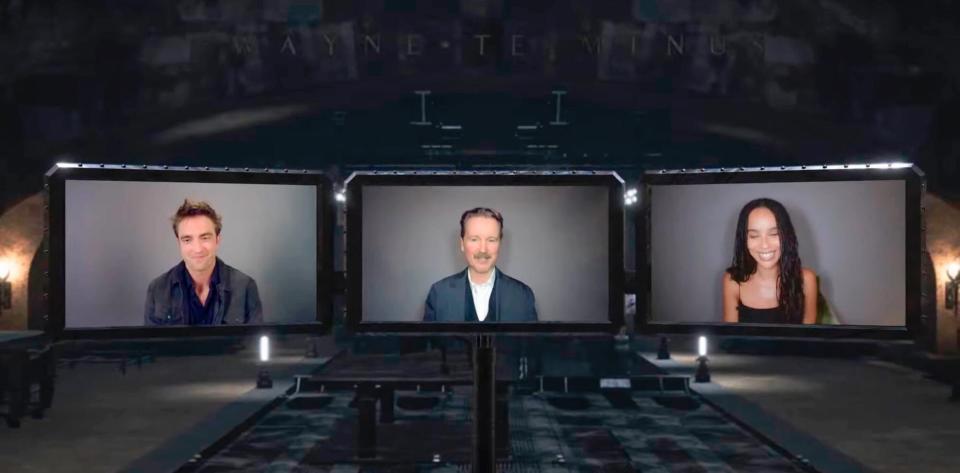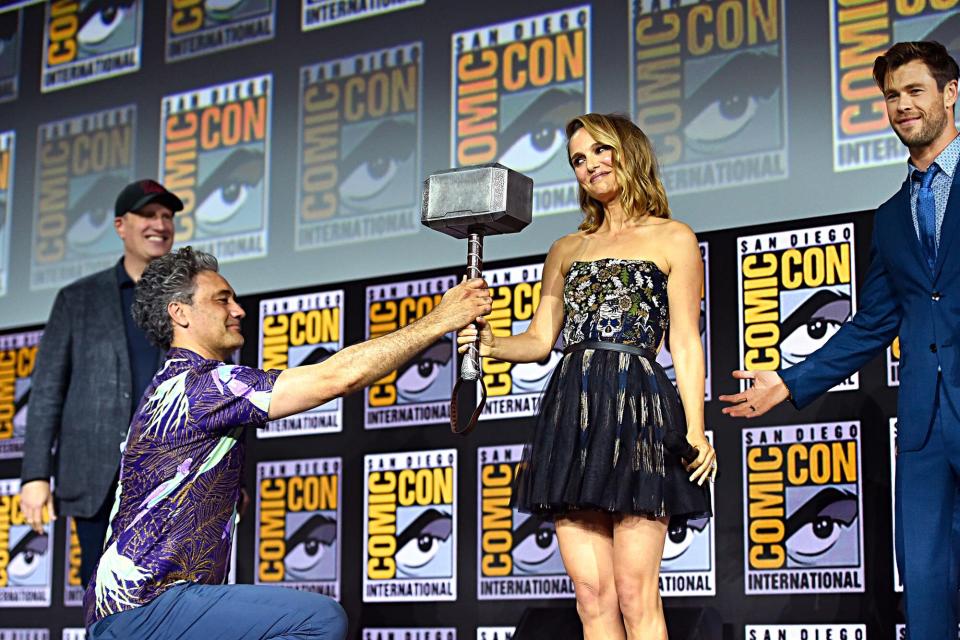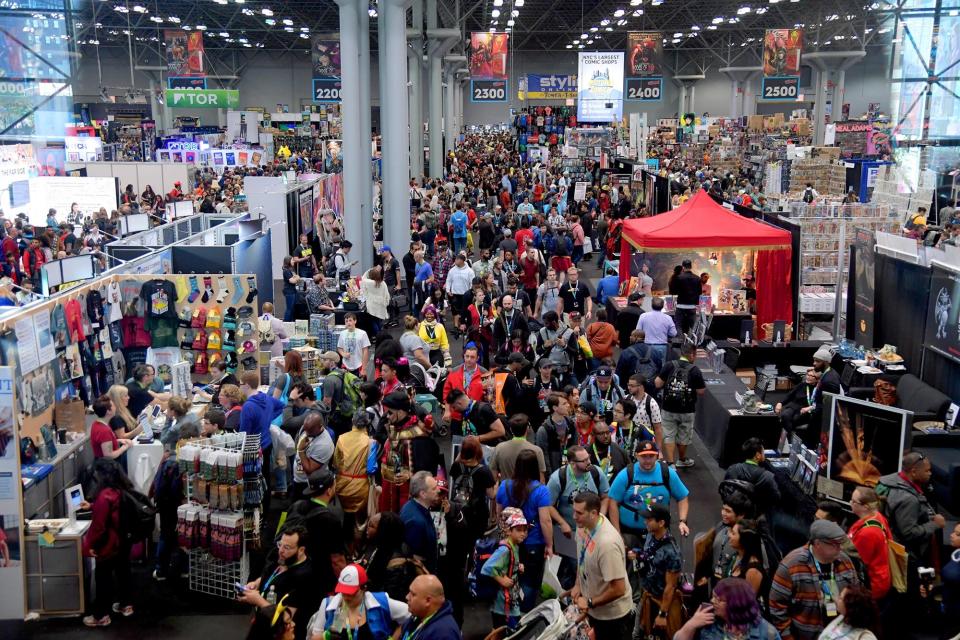Keep con and carry on: How fan conventions are bouncing back from the pandemic
New York Comic Con's first in-person edition since the start of the coronavirus pandemic felt like something from the days of yesteryear. Under "normal" circumstances, Manhattan's Javits Center would have been packed wall-to-wall on Saturday, Oct. 9, 2021, for the busiest part of the four-day pop culture event brimming with star-stuffed panels, celebrity signings, comic-book-creator meet-and-greets, and exclusive merch. But COVID-19 nearly halved attendance.
With approximately 150,000 vaccinated fans (and their masks, both surgical and sartorial) coming together last fall, compared with about 260,000 in 2019, it felt like what Comic-Con used to be before geekdom became mainstream. "We weren't going to have every major film studio," Lance Fensterman tells EW. He's the president of ReedPop, which throws this annual genre fest. "We weren't going to have every major video game publisher. Many of those organizations weren't allowing their people to travel." Still, this slimmed-down con "felt very grassroots again."
But was that pared-down experience a mere exception, or a sign of things to come? With COVID still very much a part of our daily lives, and new variants seemingly around every Hall H corner, has the era of large-scale fan gatherings made like Invisible Woman and disappeared? And is a fan gathering even a gathering if it takes place virtually?

Illustration by Kyle Hilton for EW The fan convention experience might have been forever changed by the pandemic. Those behind the scenes weigh in.
How to pull off a convention is a question all the major pop culture events are wrestling with, especially as they enter the third year of a global pandemic that some industry insiders say has fundamentally changed a landscape that was already beginning to shift and evolve. It's also forcing organizers to rewrite their playbooks on the fly. "There's not a manual you can read on how to build and run these sorts of shows," Fensterman says. "We just had to figure it out."
The irony is that prior to the pandemic, in-person conventions had never been hotter, as studios sought to create their own corporate-owned Comic-Con-like experiences to attract attendees, often in lieu of panels at the world's premiere fan gathering, Comic-Con International: San Diego. Star Wars Celebration (also produced by ReedPop, in collaboration with Lucasfilm) was one of the original big-branded events, followed by the likes of Disney's D23 Expo and Star Trek: Mission New York. One industry insider says that NBCUniversal was "actively planning" its own "mini-convention" for the spring of 2020 to showcase the company's slate of IP, including Jurassic World and Fast & Furious. COVID ultimately derailed those plans.
"Something that a lot of studios had looked at was, 'Why do we need to go down to San Diego? We can have all of our fans come to us,'" the source says. The pandemic effectively accelerated that industry shift as organizers made the pivot from in-person to virtual gatherings with an abundance of new offerings that didn't have to contend with the cost of an in-person event.

DC FanDome 'The Batman' director Matt Reeves and stars Robert Pattinson and Zoe Kravitz bring their film to DC FanDome
Without a platform like SDCC — a place that typically shows off DC's biggest upcoming titles — Warner Bros. began developing an in-house alternative, DC FanDome, which has become a global showcase of the studio's offerings channeled through one central glossy online FanDome hub, complete with first-look presentations, celebrity interviews shot remotely, and fan engagement. "I was trying to think about it in a big, broad spectrum," says Pam Lifford, president of Warner Bros. global brands and experiences. "We're getting ready to build to the biggest film and TV slate for DC in our history in 2022. Wouldn't it be great if we used this as a jumping-off point?"
Lifford wasn't the only one thinking that way. Kelly Luegenbiehl, the executive who spearheaded Netflix's The Witcher, knew that COVID would delay production on season 2 but found that fans were hungry for "not just the series, but the games and the books." So Netflix partnered with Witcher video game publisher CD Projekt Red to celebrate the entire franchise, with stars such as Henry Cavill and Freya Allan, and the creative masterminds behind various Witcher projects. WitcherCon is now just one of Netflix's virtual cons (others include TUDUM and Geeked Week).
SDCC spokesman David Glanzer doesn't worry about studio competition diminishing the industry's marquee event. "If we end up losing attendees, we would have no one but ourselves to blame," he says, "because ultimately we try to put on the type of convention we want to attend." But with in-person attendance proving to be a Riddler-size question mark, and studios now presenting their own content virtually, what is the future for the San Diego and New York fan fests, which are scheduled for July and October?

Alberto E. Rodriguez/Getty Images Natalie Portman lifts Mjolnir in Marvel Studios' Hall H panel for 'Thor: Love and Thunder' at San Diego Comic-Con

Ben Gabbe/Getty Images Crowds gather at New York Comic-Con in 2019
In 2020, NYCC canceled festivities altogether, and SDCC hosted panels on YouTube. The following year, SDCC staged a severely scaled-down "special edition" over Thanksgiving weekend, while NYCC returned to Javits as a hybrid of in-person entertainment with heavy safety protocols and a bigger virtual component than years past for those unable to attend. The Haul, an online marketplace, allowed people to purchase items and interact with artists at the event remotely, while most panels were streamed online.
San Diego's plans for this July remain a work in progress, while New York is optimistic about in-person attendance in October. "We're going!" says Fensterman, who came to a "heartening" realization from the online experience: "People like virtual events, but they don't love them." That said, he believes there will always be a virtual element to NYCC, pandemic or not. "We're not going to abandon those new ways for fans to interact now that we can return to live," he says.
In that sense, the hybrid approach is here to stay in some form. "Comic-Con will probably have some elements online that will augment the in-person shows," agrees Glanzer, who also points to the increased online accessibility, especially for those living thousands of miles away. "A lot of people wrote to say that they live in a foreign country and they've never been able to attend, but they got a feeling for what the in-person show might be. A Hollywood panel that can seat 6,000 people, some of those panels had tens of thousands of viewers."
As for those 150,000 costumed fans who did attend last fall's NYCC, Fensterman thinks they experienced something you can't quite get through a computer screen. "Maybe I'm a Luddite, but people more than ever will value that ability to come together in settings to celebrate what they love and discover things they didn't know they loved," he says. "Maybe that sort of community, in a very real and physical sense, has even greater value than it once did because of what we've been through."
A version of this story appears in the March issue of Entertainment Weekly, on newsstands now and available to order here.
Related content:

